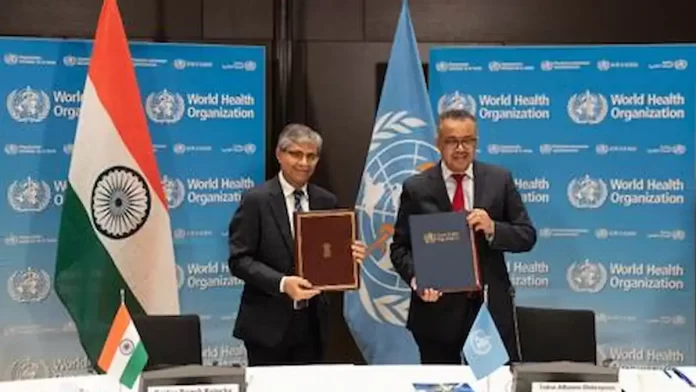India and World Health Organization on Saturday signed a Host Country Agreement to establish the WHO Global Centre of Traditional Medicine (GCTM) at Jamnagar in Gujarat. As per the agreement, GCTM’s interim office will be at the Institute of Training and Research in Ayurveda (ITRA) in Gujarat.
The Agreement was signed on 25th March in Geneva by Vaidya Rajesh Kotecha, Secretary, Ministry of Ayush and Director General, WHO Dr. Tedros Adhanom Ghebreyesus. Last month, the Union Cabinet had approved the establishment of the Centre.
WHO-GCTM is designed to engage and benefit all regions of the world. The groundbreaking ceremony will take place on 21st April 2022 in the august presence of Prime Minister Shri Narendra Modi.
WHO Global Centre for Traditional Medicine will be supported by an investment of about USD 250 million from the Government of India.
Objective of GCTM
The primary objective of GCTM is to harness the potential of traditional medicine from across the world through modern science and technology and improve the overall health of the communities the world over.
Prime Minister Narendra Modi in his message for the historic event said, “It is heartening to learn about the signing agreement for the establishment of Global Centre for Traditional Medicine”.
He said further that “through various initiatives, our government has been tireless in its endeavor to make preventive and curative healthcare, affordable and accessible to all. The global center at Jamnagar will help in providing the best healthcare solutions to the world.”
On this occasion, the Minister of Ayush Sarbanand Sonowal said that his Ministry has got this pride due to the initiative and efforts of our illustrious Prime Minister Shri Narendra Modi.
He further said that the Global Centre for Traditional Medicine will bring far-reaching benefits and reputation to traditional medicine systems around the world.
He also said that this initiative will go a long way in helping the whole of humanity to get affordable and reliable health services.
He informed the center will bring the availability of a better system to connect with the latest scientific methods.
Highlighting the importance of the Government of India initiative, the Director-General of WHO Dr. Tedros Adhanom Ghebreyesus said that harnessing the potential of traditional medicine by drawing on modern science and principles of equity and sustainability will be a game-changer for health in the 21st century.
WHO Global Centre for Traditional Medicine will be the first and only Global Centre (office) for traditional medicine across the globe.
It will focus on building a solid evidence base for policies and standards on traditional medicine practices and products and help countries integrate it as appropriate into their health systems and regulate its quality and safety for optimal and sustainable impact.
Importance of Traditional Medicine
Traditional medicine is a key pillar of health care delivery systems and plays a crucial role in maintaining good health and well-being not only in India but across the world.
In recent years, traditional medicine therapies have also seen a major transformation as usage of artificial intelligence, technological innovations have made it more accessible to the masses.
With the adoption of modern technologies, Artificial Intelligence (AI) is now being used to map evidence and trends in traditional medicine and to screen natural products for pharmacokinetic properties.
